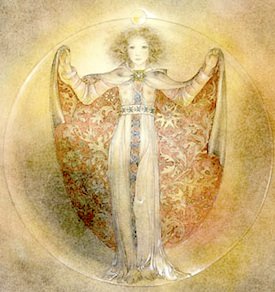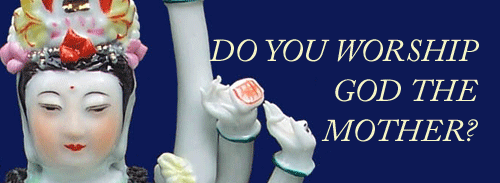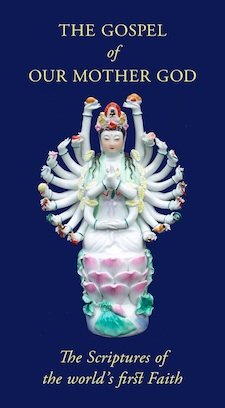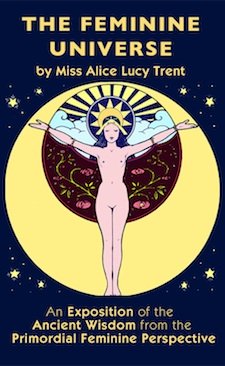Is there Life after Death?
What is the soul? And is it immortal?

Life after death. The immortal soul. Concepts that are denied by atheists and by some religions alike.
Some schools of Buddhism, for example, would deny not only that we survive death, but that we are the same person from one year – or even one minute – to another. We are (mentally) a cluster of impulses, thoughts, impressions, desires and aversions, that are constantly changing.
Western "science" (including psychology), of course, can have nothing to say on this matter, since, restricting itself by definition to the observation of phenomena on the phenomenal level (to things which, as it would say, are subject to the rules of "evidence"), the extraphenomenal nature of these phenomena (i.e., what they really are) lies wholly outside its jurisdiction.
The Scriptures of Our Mother God make what certainly seems to be a very clear statement on this matter:
47. Thou art not thy body, nor is thy body any portion of thee. 48. It is an estate which thou hold’st for a time, and after a time shall pass from thee. 49. Therefore, have thou governance of thy body, nor let it be in any thing thy ruler. 50. Keep it in purity as a temple built of earth and a place of devotion.51. Thou art not thy mind, nor is thy mind any portion of thee. 52. It is an estate which thou hold’st for a time, and after a time shall pass from thee. 53. For longer than the body shalt thou hold it; and when the body passeth into dust, still it shall be with thee. 54. Yet in its turn shall it pass away, and in its appointed season. 55. But thou shalt never pass away; when all the worlds are dust thou shalt endure.
We do indeed endure, not only from hour to hour, and throughout a lifetime, but also for all eternity. And this extends not only forward, but backwards. As the Filianic Creed says:
I believe that I am created
from before the dawn of time
by the one eternal Dea.
(And we may note that it says am created and not was created. Our creation is like a shoot growing out of the taproot of our Mother, not like a toy train that is created once, wound up and sent on its way).
Now, we said that the Scripture seems to be clear, because we do need to examine the words just a little. Certainly I am eternal. When all the worlds are dust I shall endure. But what exactly do we mean by "I"?
That "Thou art not thy body" is not difficult and is common enough in, say, popular Christianity. That "I" can survive the death of the body is disputed by atheists in Telluria but appears to be a perfectly understandable concept both to those who affirm it and to those who deny it.
But then the Scripture goes on to say "Thou art not thy mind". Now we may need to pause a moment to consider quite how radical (in terms of modern phenomenalist thinking) this statement really is.
"Survival of death", to most of us, means the persistence of the mind and emotions as they are now, in the absence of the body. The Scripture does not deny this possibility, and indeed seems to lend weight to it. But it is also made clear that the mind is not what we are. It is not the "I". And it is not immortal. It too will pass away.
So what is this "I" that is immortal? It is not the ego. It is not what we, in our everyday life, are accustomed to think of as "me".
In Déanic religion, we are taught about the true self and the false self. This is a concept that works on many levels, and on the very popular level, the kindergarten level, as it were, may refer to our good and bad impulses (the little angel and devil on our shoulder in the cartoons). This interpretation is quite valid, but it is only the bottom rung of the interpretation of this fundamental truth.
Ultimately the true self means that Self which is not other than the Supreme Self (Atma in Sanskrit) as opposed to the little self, or jivatma, that is (illusorily) cut off from its true Root and Nature.
12. For the Spirit is One, and I am the Spirit. 13. And you are the Spirit also, in the innermost temple of your heart.
14. And She who is the Spirit, My Mother, holds out Her hands to you in happiness beyond all knowing and joy beyond expression of all words.
So are those Buddhist schools wrong that deny the persistence of the self, not only from birth to birth, but from hour to hour?
They are not wrong. West Tellurian religion has for long (long before its current phase of rationalist aberration) treated statements of spiritual truth as if they were phenomenological statements – thus leading to the religious wars and heresy-hunts of European history.
Actually the Buddhist statement is simply one perspective on the Truth. Depending upon precisely how we define the "I", it can indeed be true. Its "error" lies in treating the concept of the "I" in the particular sense it has in mind.
But I place "error" in quotes because it is actually not an error at all, but an upaya – a method. The statement that we do not exist as a persistent entity from one hour to the next conflicts, and is intended to conflict, with our natural intuition of "I". It forces us to compare the "I" we think we perceive and which we think we can see receding at least back to our childhood, with the fact that that perception may not in fact be "I" at all. It is the beginning of a path – the search for the true nature of the "I".
The "I" is a very complex and elusive thing. We may "materialize it away" as phenomenal "science" does, and equally we may "spiritualize it away" as a simplistic reading of the Atma, or Buddha-nature doctrines might (in the one case saying it is merely an epiphenomenon of a material body, and in the other saying it is merely an illusory refraction of the Supreme Self).
Again, the Scriptures give us the clue to a proper understanding:
for each was a reflection of some boundless fragment of Her unbounded Spirit. And all their multitude did not exhaust the number of the fragments of Her Spirit.
Every "soul", every jiva, is the reflection of an unique aspect of Dea – or as it has been poetically expressed, the radiance of one unique facet of the Jewel that is Dea. The real "I" is indeed simply the Supreme Self veiled from Her true Identity, but at the same time is not interchangeable with any other "I". It is one perfect facet of the infinite-faceted Jewel that is One, and is the only One.
Read your Bible: The Gospel of Our Mother God
Please support the Chapel of Our Mother God
Send Questions or Comments on Life after Death
Chapel of Our Mother God Homepage
All written material at the Chapel of Our Mother God is copyright. Should you wish to reproduce any portion please contact us for permission.
YouTube or Facebook
This section:
Fundamental Beliefs
A complete guide to the faith of God the Mother
FILIANIC SCRIPTURES
Gospel of Our Mother God
The Gospel of Our Mother God is a collection of inspirational texts, prayers and daily inspiration for the Mother-Faith devotee or household.
The Feminine Universe
The Other Philosophy
Everything you have ever heard comes out of the patriarchal world-view. Its materialism, its religion, even its feminism. Here is the other way of seeing the world; the natural way: the way that everyone saw things before patriarchy and will again when patriarchy is long forgotten.


